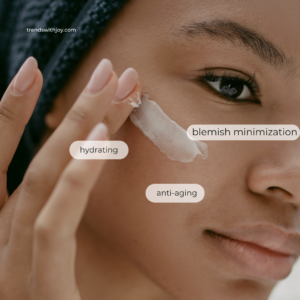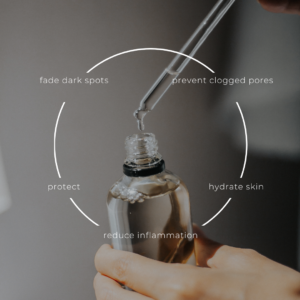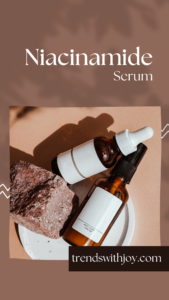Niacinamide, also known as nicotinamide, is a form of vitamin B3 that has gained significant attention in the skincare and wellness community.
It is lauded for its wide range of benefits and versatile applications, making it a staple in many skincare routines. This article will explore the many facets of niacinamide, including its benefits, uses, side effects, and the best ways to incorporate it into your daily regimen.

What is Niacinamide?
Niacinamide, a derivative of niacin (vitamin B3), is a water-soluble vitamin that plays a crucial role in cellular metabolism and energy production.
It is commonly found in various foods, supplements, and skincare products. Niacinamide is often confused with niacin, but while both are forms of vitamin B3, they have different properties and uses.
Benefits of Niacinamide
Skin Benefits
- Anti-inflammatory Properties: Niacinamide is known for its anti-inflammatory effects, making it beneficial for conditions like acne, rosacea, and eczema. It helps to reduce redness and irritation, promoting a more even skin tone.
- Anti-aging: Niacinamide helps in reducing the appearance of fine lines and wrinkles by boosting collagen production. It also improves the skin’s elasticity and strengthens the skin barrier.
- Moisture Retention: Niacinamide enhances the skin’s ability to retain moisture by increasing the production of ceramides, which are essential lipids in the skin barrier.
- Brightening: This vitamin B3 derivative can inhibit the transfer of melanin to skin cells, helping to reduce hyperpigmentation and dark spots, leading to a brighter complexion.
- Oil Regulation: Niacinamide can help regulate sebum production, making it beneficial for those with oily or combination skin types.
General Health Benefits
- Energy Production: Niacinamide plays a crucial role in the production of energy at the cellular level by participating in the synthesis of NAD+ (nicotinamide adenine dinucleotide), a coenzyme involved in cellular metabolism.
- Cognitive Function: Some studies suggest that niacinamide might have neuroprotective effects, potentially benefiting cognitive function and reducing the risk of neurodegenerative diseases.
- Joint Health: There is evidence that niacinamide may improve joint flexibility and reduce symptoms of osteoarthritis.
Niacinamide in Skincare Products

Niacinamide Serum
Niacinamide serum is one of the most popular forms of this ingredient. It is typically used after cleansing and before moisturizing. Brands like The Ordinary offer highly concentrated niacinamide serums, providing potent benefits for the skin.
Niacinamide Toner
Niacinamide toners can help to balance the skin’s pH, hydrate, and prepare the skin for further treatment steps. They are particularly useful for those with sensitive skin.
Niacinamide Moisturizer
Moisturizers containing niacinamide provide hydration while also delivering the benefits of this powerful vitamin B3 derivative. These moisturizers are suitable for all skin types.
Niacinamide in Supplements
Niacinamide Pills
Niacinamide supplements are available in pill form and can provide systemic benefits, such as improved skin health, enhanced energy production, and potential cognitive benefits.
Niacinamide Mononucleotide and Niacinamide Riboside
These are advanced forms of niacinamide used in supplements to boost NAD+ levels more effectively, which may have anti-aging and health-promoting effects.
Niacinamide-Rich Foods
Including niacinamide-rich foods in your diet can help you achieve the benefits of this vitamin. Foods such as chicken, turkey, beef, fish, nuts, seeds, and legumes are excellent sources of vitamin B3.
Potential Side Effects of Niacinamide
While niacinamide is generally well-tolerated, some people may experience side effects such as mild irritation or redness when used topically.
It is always recommended to perform a patch test before introducing a new product into your skincare routine.
When taken in high doses as a supplement, niacinamide can cause side effects like liver damage, so it is important to follow recommended dosages.
Niacinamide in Popular Skincare Brands

The Ordinary
The Ordinary offers a highly popular Niacinamide 10% + Zinc 1% serum, which is praised for its efficacy in reducing blemishes and balancing sebum production.
Olay
Olay’s products, such as the Olay Regenerist line, often include niacinamide due to its anti-aging and skin barrier-strengthening properties.
CeraVe
CeraVe incorporates niacinamide in many of its formulations, including its cleansers and moisturizers, to provide hydration and improve skin texture.
Niacinamide and Hyaluronic Acid
Combining niacinamide with hyaluronic acid can amplify the hydrating and anti-aging benefits. Hyaluronic acid attracts moisture to the skin, while niacinamide helps to retain it and improve the skin barrier.
Niacinamide Uses for Skin Conditions
Acne
Niacinamide is effective in treating acne due to its anti-inflammatory and sebum-regulating properties. It can reduce the severity and frequency of breakouts.
Hyperpigmentation
Niacinamide can help fade dark spots and hyperpigmentation by inhibiting the transfer of melanin to skin cells.
Aging
Regular use of niacinamide can help reduce the signs of aging by promoting collagen production and improving skin elasticity.
Niacinamide for Specific Skin Types
Sensitive Skin
Niacinamide is suitable for sensitive skin as it helps to reduce inflammation and strengthen the skin barrier without irritating it.
Oily Skin
Its ability to regulate sebum production makes niacinamide an excellent choice for oily skin, helping to reduce shine and prevent clogged pores.
Dry Skin
By boosting ceramide production, niacinamide helps dry skin retain moisture and improve overall hydration.
Niacinamide Before and After
Numerous users report significant improvements in their skin condition after incorporating niacinamide into their routine.
Benefits often include reduced redness, fewer breakouts, improved skin texture, and a more even complexion.
Niacinamide in Specialty Products
Niacinamide Dew Drops
These products provide an instant glow and hydration boost, often combining niacinamide with other beneficial ingredients.
Niacinamide Face Wash
Face washes containing niacinamide help to cleanse the skin while delivering the benefits of niacinamide, such as reducing redness and controlling oil production.
Niacinamide Brightening Toner
These toners help to brighten the complexion and even out skin tone, making them a popular choice for those dealing with hyperpigmentation.
Niacinamide and Other Health Benefits
Cholesterol
Niacinamide may help to lower cholesterol levels, contributing to better cardiovascular health.
Dogs
In veterinary medicine, niacinamide is used to treat various skin conditions in dogs, such as pemphigus, due to its anti-inflammatory properties.
Pregnancy
Niacinamide is generally considered safe for use during pregnancy, providing benefits such as improved skin hydration and barrier function.
Niacinamide in Lifestyle and Wellness
Niacinamide Supplements
Supplements containing niacinamide can support overall health by enhancing energy production and providing neuroprotective benefits.
Niacinamide Foods
Incorporating niacinamide-rich foods into your diet can support skin health and overall well-being.
Niacinamide is a versatile and powerful ingredient that offers a wide range of benefits for the skin and overall health.
Whether used topically in serums, toners, and moisturizers, or taken as a supplement, niacinamide can improve skin texture, reduce inflammation, and support general health.
As with any supplement or skincare product, it is important to use niacinamide correctly and consult with a healthcare professional if you have any concerns.
By understanding the many benefits and uses of niacinamide, you can make informed decisions about how to incorporate this valuable ingredient into your daily routine, achieving healthier, more radiant skin and overall well-being.

